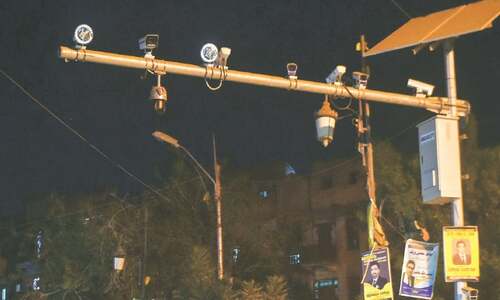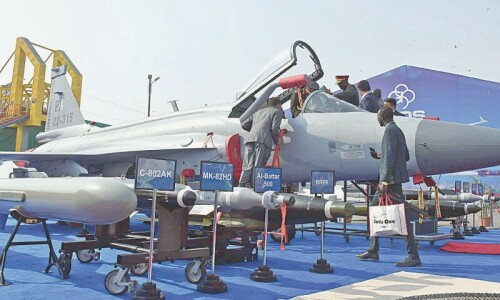THATTA, May 3: Almost all parties contesting the May 11 general elections from Thatta district constituencies are much concerned about women participation in the polling considering a very low or no turnout of female voters at many polling stations in the past elections.
The areas where no women voters turned up to cast her vote appeared to be the scattered islands, creeks and far flung coastal villages falling within the remit of the district.
Over the past two decades, secular and democratic forces supported by broadminded leadership of various non-religious organisations, social forum and non-governmental organisations have been making their efforts at national, provincial and regional levels to transform society and change its orthodox image to secular one and achieve the goal of empowering women in all spheres of life.
The efforts, however, have met a little success.
Pro-democracy parties are more enthusiastic about women empowerment as this may ultimately redouble their vote bank considering the fact that women make more than 50 per cent of the country’s population, hence a huge female voters number.
Their frustration over negligible progress was evident from a recent move by elected representatives to hold in abeyance an election rule envisaging withholding of the result of a particular constituency if 10 per cent of women voters there did not use their right to franchise.
“Women votes matter in a close contest,” said local leaders of the Pakistan People’s Party, Pakistan Muslim League-Nawaz and Functional and the Shirazi group here in the district.
When asked if they expect womenfolk to take part in the election process in a more enthusiastic manner than before, they appeared not optimistic at all.
The past record shows that women votes in Thatta constituencies make only two-three per cent of the total votes cast.
In some constituencies — covering the creek areas, coastal villages and islands — it is zero per cent.
Humaira Alwani, who is coordinating PPP candidate Awais Muzaffar Tappi’s election campaign in PS-88 Ghorabari, says there has been no remarkable change in the trend in this part of the province in recent years.
She sees unchanged cultural and traditional values in the rural as well as most urban pockets of the district as impediments.
She says that another big factor is distance between voters’ area of residence and their polling stations.
There are at least six polling stations in the Jat-dominated areas which are not easily accessible for voters, according to her. She says a number of other polling stations usually set up in far flung areas with a view to facilitate polling in coastal towns and villages never record a turnout higher than two-three per cent of the total votes cast.
Mr Tappi, his main rival fielded by the Shirazi group Haji Usman Malkani and another candidate, Pakistan Fisherfolk Forum chief Syed Mohammad Ali Shah, also believe that women turnout in upcoming general election in Thatta district will not be encouraging.
They say that most eligible women voters of the district do not have CNICs and may not be able to cast their votes.
They endorsed the views of a group of women rights campaigners that a large number of women voters had lost their CNICs during the recent floods and many of them are waiting for duplicate cards to be delivered to them.
The women are feared to be left out, they apprehend.
Mr Tappi, said to be foster brother of President Asif Ali Zardari, used his influence to help people get their CNICs before start of the May 11 election.
He and his rival candidates agree that illiteracy and poverty were responsible for a low awareness of human and women rights in the district.
A villager, Jumman Jat, told this reporter that candidates of the Thatta seats were desperately seeking some educated women polling agents in certain parts of their constituencies.
“I can say that in some coastal towns, creek areas and villages, it is next to impossible to find one,” he said.
Apart from the general problems commonly faced by voters in the whole province, the issue of orthodoxy in family also cast its impact on women voters’ turnout.
Tribes and clans inhabiting the coastal district do not allow their women to take active part or cast vote in elections. In most cases, the womenfolk are barred from attending public events like public meetings relating to elections or awareness of issues.
Elites of the Baloch, Jat, Zangiani, Kalmati, Perozani and other tribes of Thatta who spoke to this scribe were disapprove of rural women’s enthusiasm, willingness and interest vis-à-vis the elections.
“Traditionally women are not allowed (by heads of their families) to go to the polling stations for casting their votes,” they said.
Humaira Alwani appeared resentful about the customary restrictions, saying that backwardness remains a big hurdle in the progress of this region.
Neelam Abbasi, another PPP activist said that women workers of her party had been regularly visiting households to meet women and persuade them to play an active role in promoting democracy.
“Most women assure us that they will everything they can for the party of Bhuttos.
However, the customary restrictions defeat their will and frustrate their ambitions when it comes to voting,” she said.
A candidate for PS-85 Mirpur Sakro constituency is Jam Owais Gohram, who is a son of the Jokhia tribe chieftain.
He is the main rival of PPP contestant, Sassui Palijo, the minister for culture in the outgoing coalition.
Ms Palijo always insist that the Jokhia tribe and all other tribes living in her constituency to encourage their womenfolk to cast their votes.
There has no pledge from any tribal chief of the area on whether any of them will think positive over the issue of women’s right to franchise.















































Dear visitor, the comments section is undergoing an overhaul and will return soon.